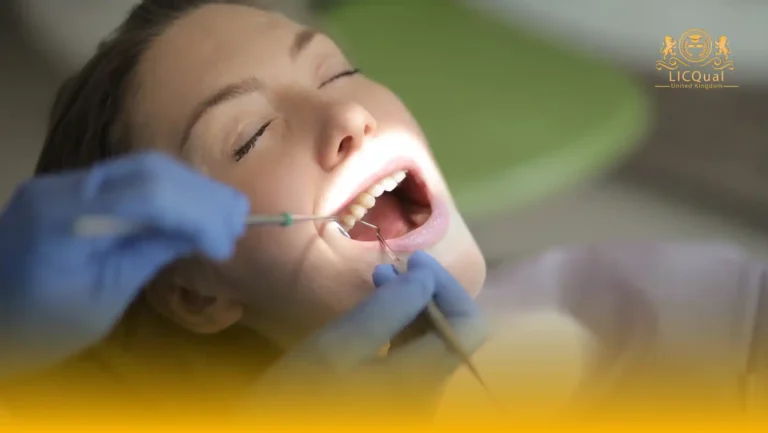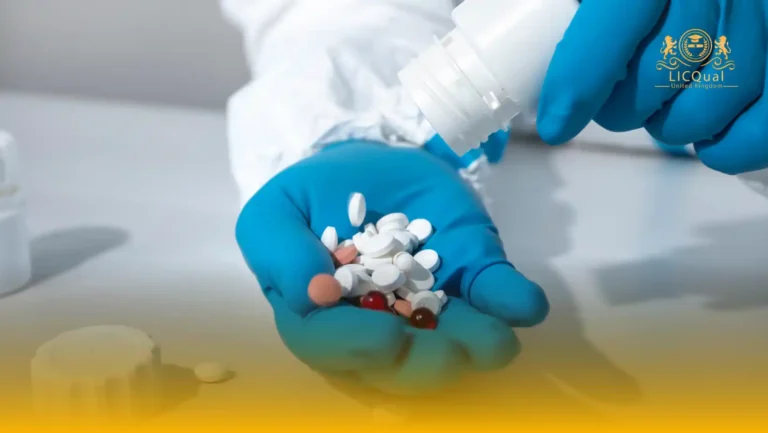The LICQual Level 7 Postgraduate Diploma in Pediatric Nutrition (PgD Pediatric Nutrition) is a highly specialized qualification designed to advance the expertise of healthcare and nutrition professionals working with children and adolescents. This programme goes beyond foundational knowledge, offering in-depth insights into the latest research, strategies, and evidence-based practices in pediatric nutrition. It is particularly suited for those already established in the health, medical, or nutrition sectors who are looking to enhance their career prospects, expand their professional knowledge, and strengthen their Continuing Professional Development (CPD).
Unlike entry-level programmes, this diploma is not designed for fresh candidates. Instead, it provides advanced training for experienced professionals who wish to address complex nutritional challenges, develop effective interventions, and support optimal growth and health outcomes for young populations. Learners will benefit from a curriculum that combines scientific theory with practical applications, ensuring they are equipped to apply advanced nutritional principles in real-world professional settings.
Centres offering this qualification must ensure that they provide a robust learning environment. This includes having highly competent and qualified staff with relevant subject expertise, alongside access to the latest resources, tools, and materials required for effective delivery. Such standards guarantee that learners receive high-quality training, achieve meaningful learning outcomes, and gain the confidence to apply their advanced knowledge in practice.
The PgD in Paediatric Nutrition is therefore an ideal choice for professionals committed to advancing their skills, meeting industry demands, and achieving excellence in the field of child and adolescent nutrition.
Course Overview
Qualification Title
LICQual Level 7 Postgraduate Diploma in Pediatric Nutrition (PgD Pediatric Nutrition)
Total Units
6
Total Credits
120
GLH
600
Qualification #
LICQ2201096
Qualification Specification
To enroll in the LICQual Level 7 Postgraduate Diploma in Pediatric Nutrition (PgD Pediatric Nutrition), applicants must meet the following criteria:
|
Qualification# |
Unit Title |
Credits |
GLH |
|---|---|---|---|
|
LICQ2201096-1 |
Advanced Principles of Paediatric Nutrition |
20 |
100 |
|
LICQ2201096-2 |
Nutritional Assessment and Dietary Planning for Children |
20 |
100 |
|
LICQ2201096-3 |
Clinical Paediatric Nutrition and Disease Management |
20 |
100 |
|
LICQ2201096-4 |
Public Health Nutrition and Paediatric Policy Development |
20 |
100 |
|
LICQ2201096-5 |
Research Methods and Evidence-Based Practice in Paediatric Nutrition |
20 |
100 |
|
LICQ2201096-6 |
Professional Practice, Ethics, and Continuing Development in Paediatric Nutrition |
20 |
100 |
By the end of this course, learners will be able to:
Unit 1: Advanced Principles of Paediatric Nutrition
By the end of this unit, learners will be able to:
- Critically evaluate the physiological and metabolic needs of infants, children, and adolescents.
- Analyse the role of macronutrients and micronutrients in supporting growth and development.
- Assess the impact of developmental stages on nutritional requirements.
- Apply advanced knowledge of nutritional science to paediatric health contexts.
Unit 2: Nutritional Assessment and Dietary Planning for Children
By the end of this unit, learners will be able to:
- Conduct comprehensive nutritional assessments using appropriate tools and techniques.
- Interpret growth charts, anthropometric data, and dietary intake patterns.
- Design tailored, evidence-based dietary plans for paediatric populations.
- Evaluate the effectiveness of dietary interventions in improving health outcomes.
Unit 3: Clinical Paediatric Nutrition and Disease Management
By the end of this unit, learners will be able to:
- Critically analyse the role of nutrition in preventing and managing paediatric diseases.
- Formulate nutritional strategies for conditions such as obesity, diabetes, allergies, and malnutrition.
- Integrate clinical guidelines into the design of paediatric nutrition interventions.
- Evaluate outcomes of nutrition-based therapies for children with chronic conditions.
Unit 4: Public Health Nutrition and Paediatric Policy Development
By the end of this unit, learners will be able to:
- Examine the relationship between public health policies and paediatric nutrition outcomes.
- Assess the effectiveness of global and regional nutrition initiatives for child health.
- Design strategies to promote healthy eating behaviours at community and national levels.
- Critically evaluate public health interventions aimed at reducing paediatric nutrition inequalities.
Unit 5: Research Methods and Evidence-Based Practice in Paediatric Nutrition
By the end of this unit, learners will be able to:
- Design and implement research projects in the field of paediatric nutrition.
- Apply appropriate statistical tools and methods to analyse research data.
- Critically appraise scientific literature to support evidence-based practice.
- Translate research findings into practical nutritional interventions and policy recommendations.
Unit 6: Professional Practice, Ethics, and Continuing Development in Paediatric Nutrition
By the end of this unit, learners will be able to:
- Apply professional standards, ethical principles, and codes of conduct in practice.
- Demonstrate advanced skills in leadership, communication, and interdisciplinary collaboration.
- Reflect critically on personal practice to identify areas for professional growth.
- Develop a structured plan for Continuing Professional Development (CPD) in paediatric nutrition.
The LICQual Level 7 Postgraduate Diploma in Pediatric Nutrition (PgD Pediatric Nutrition) is designed for healthcare professionals and learners who want to specialise in child nutrition, feeding practices, and pediatric health. This qualification is ideal for those aiming to enhance their expertise, gain professional recognition, or progress into senior clinical, research, or leadership roles. It is suitable for dietitians, pediatric nurses, healthcare practitioners, and early years professionals seeking a Level 7 postgraduate diploma with practical and scientific relevance.
Healthcare and Clinical Professionals
- Pediatric nurses aiming to enhance nutrition knowledge
- Registered dietitians specialising in child health
- Allied health professionals integrating nutrition into patient care
- Professionals seeking an accredited Level 7 postgraduate diploma
- Practitioners applying evidence-based pediatric nutrition interventions
- Healthcare professionals seeking international recognition
Pediatric Dietitians and Nutrition Specialists
- Dietitians focusing on infant and child nutrition
- Pediatric nutritionists providing clinical dietary guidance
- Professionals seeking advanced qualification in pediatric nutrition
- Practitioners aiming to enhance credibility in child nutrition
- Experts applying research-based nutrition strategies
- Specialists supporting growth, development, and feeding practices
Early Years and Childcare Professionals
- Nursery and preschool educators promoting healthy nutrition
- Early years practitioners implementing age-appropriate dietary plans
- Childcare providers assisting with feeding challenges
- Professionals seeking Level 7 diploma in pediatric nutrition
- Staff supporting long-term wellbeing through nutrition
- Individuals aiming to apply practical feeding strategies
Research and Academic Professionals
- Researchers supporting pediatric nutrition studies
- Academics teaching child health, dietetics, or early years programs
- Individuals analysing nutritional impacts on child development
- Professionals seeking Level 7 qualification for research progression
- Practitioners designing evidence-based nutrition interventions
- Learners aiming to enhance academic credibility
Career Changers and Aspiring Professionals
- Individuals transitioning into pediatric nutrition careers
- Graduates pursuing structured postgraduate progression in child health
- Professionals from related sectors seeking accredited pediatric nutrition qualifications
- Learners aiming for international Level 7 recognition for career advancement
- Career-focused individuals seeking practical and scientific expertise
- Those planning to enter clinical, childcare, or research sectors
Public Health and Policy Professionals
- Public health officers implementing child nutrition programs
- Policy advisors supporting health and dietary initiatives for children
- Professionals contributing to community nutrition strategies
- Learners seeking Level 7 qualification for leadership roles
- Practitioners designing evidence-based pediatric nutrition policies
- Professionals influencing child health and nutrition outcomes
Professionals Seeking Academic and Professional Progression
- Learners planning further study in pediatric nutrition or health sciences
- Professionals seeking globally recognised qualifications for career growth
- Individuals aiming to strengthen expertise in child-focused nutrition practice
- Practitioners aspiring to senior or specialist roles in pediatric nutrition
- Learners seeking structured, research-informed professional development
- Professionals committed to long-term careers in pediatric nutrition
Centres delivering the LICQual Level 7 Postgraduate Diploma in Paediatric Nutrition must meet strict quality and compliance standards to ensure learners receive effective training and achieve successful outcomes. The following requirements must be in place:
- Qualified and Competent Staff:
Delivery must be led by tutors, trainers, and assessors with recognised qualifications and substantial professional experience in paediatric nutrition, dietetics, or related health sciences. Staff must also demonstrate a commitment to Continuing Professional Development (CPD). - Access to Learning Resources:
Centres must provide up-to-date textbooks, journals, case studies, and access to digital learning platforms. Learners should also have resources for nutritional assessment tools and paediatric dietary planning. - Facilities and Infrastructure:
Suitable classrooms, lecture spaces, and online learning environments must be available. Where practical elements are included, centres must ensure access to appropriate equipment and facilities. - Assessment and Quality Assurance:
Centres must have robust systems for internal assessment, moderation, and quality assurance in line with international standards. Assessors must be fully trained to evaluate advanced academic and professional competencies. - Learner Support Services:
Centres should offer academic guidance, career advice, and pastoral support to help learners succeed. Dedicated support must be available for learners engaging through blended or distance learning. - Compliance with Ethical and Professional Standards:
Centres must uphold integrity, fairness, and inclusivity in recruitment, delivery, and assessment, ensuring equal opportunities for all learners.
By meeting these requirements, centres can deliver a high-quality learning experience that supports learners in advancing their careers and contributing to excellence in pediatric nutrition.
Assessment and Verification
All units within this qualification are subject to internal assessment by the approved centre and external verification by LICQual. The qualification follows a criterion-referenced assessment approach, ensuring that learners meet all specified learning outcomes.
To achieve a ‘Pass’ in any unit, learners must provide valid, sufficient, and authentic evidence demonstrating their attainment of all learning outcomes and compliance with the prescribed assessment criteria. The Assessor is responsible for evaluating the evidence and determining whether the learner has successfully met the required standards.
Assessors must maintain a clear and comprehensive audit trail, documenting the basis for their assessment decisions to ensure transparency, consistency, and compliance with quality assurance requirements.







